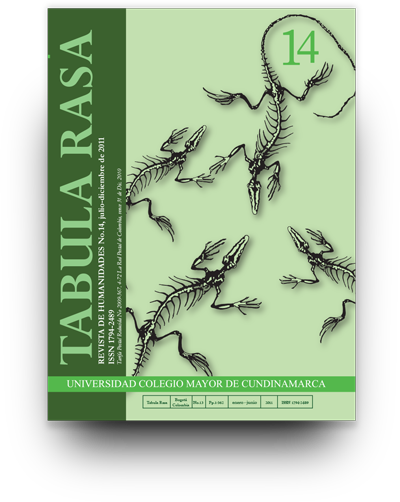Analítica de lo moderno: Una introducción
Analytics of the modern: An introduction
Mostrar biografía de los autores
Este texto plantea la relevancia de abordar la modernidad como objeto etnográfco, esto es, examinarla desde discursos y prácticas situadas. Esta etnografía se inspira en un enfoque foucaultiano donde la gubernamentalidad es una categoría clave. Desde esta perspectiva, se propone un abordaje que examine tres dimensiones analíticas de la modernidad. En primera instancia están las razones de gobierno; esta dimensión reúne todas aquellas formas de conocimiento, de experticia y de cálculo que hacen posible que pensemos a los seres humanos como susceptibles de programación política. En segundo lugar están las técnicas de gobierno; al ámbito de lo técnico pertenecen los mecanismos prácticos, los instrumentos y los programas por medio de los cuales autoridades de distintos tipos buscan dar forma e instrumentalizar la conducta humana. Finalmente están los sujetos de gobierno; esta dimensión cubre los diversos tipos de identidad individual y colectiva que emergen a partir de, y al mismo tiempo sustentan, la actividad gubernamental.
Visitas del artículo 96 | Visitas PDF 58
Descargas
Castel, Robert. 1981. La gestion des risques: De l’anti-psychiatrie a` l’apre`s-psychanalyse. Paris: Editions de Minuit.
Collier, Stephen J., and Aihwa Ong. 2003. “Oikos/Anthropos: Rationality, Technology, Infrastructure”. Current Anthropology 44(3): 421–426.
Cruikshank, Barbara. 1999. The Will to Empower: Democratic Citizens and Other Subjects. Ithaca: Cornell University Press.
Dean, Mitchell. 1991. The Constitution of Poverty: Toward a Genealogy of Liberal Governance. New York: Routledge.
Dean, Mitchell. 1999. Governmentality: Power and Rule in Modern Society. London: Sage
.
Defert, Daniel. 1991. “‘Popular Life’ and Insurance Technology”. En Graham Burchell, Colin Gordon, and Peter Miller, (eds.) The Foucault Effect: Studies in Governmentality. 211– 233. Chicago: University of Chicago Press.
Ewald, Françoise. 1986. L’e´tat providence. Paris: Grasset.
Foucault, Michel. 1979. Discipline and Punish: The Birth of the Prison. New York: Vintage Books. [1976. Vigilar y Castigar: nacimiento de la prisión. Traducción de Aurelio Garzón del Camino. México: Siglo XXI].
Foucault, Michel. 1980. The History of Sexuality, vol. 1: An Introduction. New York: Vintage Books. [1977. Historia de la sexualidad. 1- La voluntad de saber. Traducción de Ulises Guiñazú. México: Siglo XXI].
Foucault, Michel. 2000. “Governmentality”. En The Essential Works of Foucault, 1954– 1984, vol. 3: Power. James D. Faubion, ed. Pp. 201–222. New York: New Press. [[1978]
1999. «La ‘gubernamentalidad’». En: Estética, ética y hermenéutica. Obras Esenciales. Volumen III. pp 175-197. Barcelona: Paidós.
Greenhalgh, Susan. 2003. “Planned Births, Unplanned Persons: ‘‘Population’’ in the Making of Chinese Modernity”. American Ethnologist 30(2): 196–215.
Hindess, Barry. 1996. Discourses of Power: From Hobbes to Foucault. Malden, MA: Blackwell.
Horn, David G. 1994. Social Bodies: Science, Reproduction, and Italian Modernity. Princeton:Princeton University Press.
Horn, David G. 2003 .The Criminal Body: Lombroso and the Anatomy of Deviance. New York: Routledge.
Kalpagam, U. 2002. “Colonial Governmentality and the Public Sphere in India”. Journal of Historical Sociology 15(1): 35–58.
Latour, Bruno. 1986. “Visualization and Cognition: Thinking with Eyes and Hands”. Knowledge and Society 6: 1–40.
McNay, Lois. 1994. Foucault: A Critical Introduction. New York: Continuum.
Mbembe, Achille. 2003. “Necropolitics”. Public Culture. 15(1): 11–40. Miller, Peter, and Nikolas Rose. 1990. “Governing Economic Life”. Economy and Society
19(1): 1–31.
O’Malley, Pat. 1992. “Risk, Power, and Crime Prevention”. Economy and Society 21(3): 252–275.
Ong, Aihwa. 1995. “Making the Biopolitical Subject: Cambodian Immigrants, Refugee Medicine, and Cultural Citizenship in California”. Social Science and Medicine 40(9):1243–1257.
Ong, Aihwa. 1999. Flexible Citizenship: The Cultural Logics of Transnationality. Durham, NC: Duke University Press.
Ong, Aihwa, and Stephen J. Collier, eds. 2004. Global Assemblages: Technology, Politics, and Ethics as Anthropological Problems. Malden, MA: Blackwell.
Perry, Richard Warren, and Bill Maurer. 2003. “Globalization and Governmentality: An Introduction”. En Globalization Under Construction: Governmentality, Law, and Identity. Richard Warren Perry and Bill Maurer, eds. Pp. ix–xxi. Minneapolis: University of Minnesota Press.
Procacci, Giovanna.1993. Gouverner la misère: La question sociale en France, 1789–1848. Paris: Editions du Seuil.
Rabinow, Paul. 1984. “Introduction”. En The Foucault Reader. Paul Rabinow, ed. Pp. 3–29. New York: Pantheon Books.
Rabinow, Paul. 1989. French Modern: Norms and Forms of the Social Environment. Cambridge, MA: MIT Press.
Rabinow, Paul. 2003. Anthropos Today: Reflections on Modern Equipment. Princeton: Princeton University Press.
ose, Nikolas. 1996. “Governing ‘Advanced’ Liberal Democracies”. En Andrew Barry, Thomas Osborne, and Nikolas Rose, (eds.), Foucault and Political Reason: Liberalism, NeoLiberalism, and Rationalities of Government. 37–64. Chicago: University of ChicagoPress.
Rose, Nikolas. 1998. Inventing Our Selves: Psychology, Power, and Personhood. Cambridge: Cambridge University Press.
Rose, Nikolas. 1999. Powers of Freedom: Reframing Political Thought. Cambridge: Cambridge University Press.
Rose, Nikolas. 2000. “Government and Control”. British Journal of Criminology 40: 321–339.
Rose, Nikolas. 2001. “The Politics of Life Itself ”. Theory, Culture & Society 18(6): 1–30.
Rose, Nikolas, and Peter Miller. 1992. “Political Power Beyond the State: Problematics of Government”. British Journal of Sociology 43(2): 173–205.
Ruhl, Lealle. 1999. “Liberal Governance and Prenatal Care: Risk and Regulation in Pregnancy”. Economy and Society 28(1): 95–117.
Stoler, Ann Laura. 1995. Race and the Education of Desire: Foucault’s History of Sexuality and the Colonial Order of Things. Durham, NC: Duke University Press.
Walters, William. 2000. Unemployment and Government: Genealogies of the Social. Cambridge: Cambridge University Press.
Weir, Lorna. 1996. “Recent Developments in the Government of Pregnancy”. Economy and Society 25(3): 372–392.




